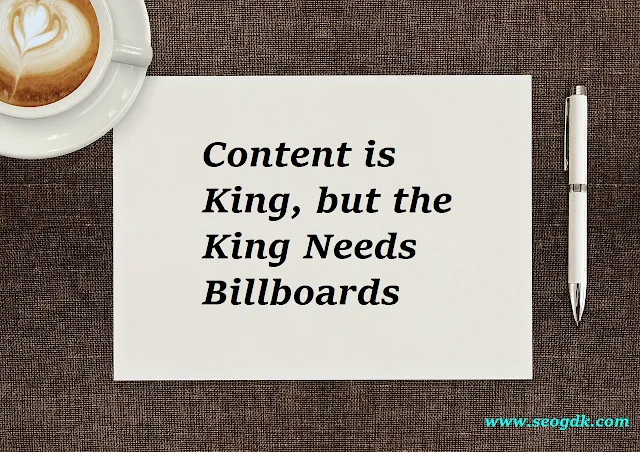Hello friends, As you know since last month Seogdk running a "Blog of the Month (BOM) Series" in which we invite famed bloggers to share their knowledge, and ideas via guest posts.
In this series, this month we invited David Leonhardt; Founder of SEO Writer. In this post, he explores valuable information about the importance of content and its vital role in SEO and search engines.
So don't take much more time to hand it over to David.....
If you’ve heard the phrase “Content is King” a thousand times, you are not alone. Like any adage that gets repeated often enough, it tends to lose meaning over time. People repeat it without understanding its full implications.
Since then, the quote has been appropriated by the world of SEO to mean, roughly, that the most important ranking factor is content. And that is correct, to a point. It was then, it is now; some things in SEO never change. More on that later.
The problem, of course, is that many small businesses have decided to create content and assume that they will rank in Google and Bing on the power of their content alone. That is always a mistake.
In the story of Hansel and Gretel, the Wicked Witch got lucky when two children were left to fend for themselves in the deep, dark forest. Who knows how many years she had been waiting for her first customer. And who knows how many evil witches had invested in fancy candy houses somewhere in the deep, dark forest, without ever getting a customer. Great content is useless without a promotion strategy.
Businesses that create great content on their websites have taken the first step toward a sound SEO strategy. In fact, content is King because the content is the foundation of good SEO. Why? Because the whole point of Google and Bing listing a web page in their results is to send people to the content they want. If you don’t have the content people are searching for, you don’t deserve to rank for that search and Google doesn’t want to rank you for that search.
But Google and Bing have no way of knowing that your content is the best, the most valued, and the most authoritative if you don’t give them clues. Lots of clues. No, seriously, I mean tons and tons and tons of clues.
Those clues are easy enough to understand. If somebody tweets your content, that’s a clue. If somebody posts a link to your content on Facebook, that’s a clue. If somebody posts the content on BizSugar or Snapzu or Tsu or Pinterest, those are all clues. Every share, every comment, every vote is a clue. Google doesn’t necessarily read all the clues on every site, but the more you get your content shared with other people, the better you will do.
When a blogger posts a link to your page, that’s a clue. When a news site links to your page, that’s a clue. When a properly curated directory links to your site, that’s a clue.
The content might be King, but the King needs subjects to rule. Don’t forget that the Pharaoh was King, but the Pyramids were built by thousands of slaves and laborers, not the Pharaoh.
There are many ways to give the search engines your clues. The best way is to build a strong social media following, and then spread the word through platforms like Viral Content Bee and Just Retweet. Another great way is to build relationships with bloggers – don’t try cold-calling, because it won’t work – and offer to provide guest posts. Another way is to submit new content to blog carnivals. There are several other methods listed on this blog, such as submitting Infographics and promoting press releases.
There is one more important step. You have to be very careful not to allow the clues to look contrived. If it looks to Google or Bing as though they are contrived, they will not be clues that your site is authoritative or that your content is valuable; they will be clues that you are trying to game the system. These clues have to come naturally, like recommendations, just because your content is so awesome.
There is a huge gray area between legitimate promotion and “black” hat cheating. Given how violently Google’s algorithm has decimated websites when it decides to clean up the Web, I recommend playing it safe, well away from anything that Google might perceive as contrived.
What does this mean for Your Business Strategically?
1. Get a good writer. I don’t mean just someone who has a good command of English, or whatever other languages you are communicating in. The writer should have a great sense of story and also be strategic in targeting sub-niches within your market and phrases people use to search for what you have to offer.
2. Get a PR consultant. This should be someone who understands how to create content that people will want to share and who can give you reach in social media and the blogosphere.
Don’t just build a candy house in the deep, dark woods. Make sure there are billboards and paved roads and barkers calling out. Google and Bing have to find a highway to your door, and if they do, watch how everybody else follows.














No comments:
Post a Comment